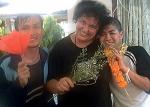Doctors Without Borders & Burma
Aid to Burma
Wednesday June 4
Press Conference with Doctors Without Borders
Foreign Correspondent’s Club of Thailand in Bangkok
Question: How many people still need help?
Answer: Cannot estimate people who still need help…there are little huts among many little rivers…don’t know what was a village…was it there…how many huts were lost. Could get into the west…were obstructed from getting into the east by the authorities. So we cannot say how many people still need help.
Question: Oxfam has said there was going to be a second wave of death.
Answer: Medicins Sans Frontiers disagrees. Have not seen outbreaks. It is still a possibility. There were supposed to be 1.2 million dying…we cannot see that now.
Question: How do you deliver aid?
Answer: We use locals to distribute the aid. We use local community health workers to bring a daily structure to people in the camps, for example to set up activities, schooling etc. for the children and help reconstruct the society. Monastaries had central role…people visited them immediately during and after storm. Important for rituals because it is very important for survivors that that lost family members can continue in the next life. They also give advice so monks are not left out of aid process.
Question: How are you helping the children?
Answer: For children a systemic approach is best. We find out what is going on with parents, what is going on with children. We do simple things like if a child has sleep problems we tell parents to play with children before sleep.
Question: We have heard there are 2000 orphans. Are there more?
What are the concerns regarding orphans…different or same in this situation as other situations?
Answer: Orphans are taken by other families or they go to the monastaries. Have not seen orphans left alone or uncared for. These are very caring people in Burma. But the numbers are frightening. They are more vulnerable because they don’t have a normal protective environment. Quite difficult for them…the sole survivors are less playful, more withdrawn. Many cling to surviving siblings.
Question: What about water supplies? Sanitation?
Answer: In Laputa we installed two water treatment kits which processes 25,000 liters of drinking water per hour which is then distributed. We pump the water out of the tanks that are now filled with salt water and dead bodies. Nature does the rest. We have distributed 50,000 cans where people can store water. Latrines were destroyed…we are taking care of that.
Question: Are the authorities helping or hindering?
Answer: They are not hindering except for not allowing international staff in. Sometimes they provide rice, money or bamboo for shelter for people who have to leave temporary shelters. But NGO’s are not a large support to us directly…we don’t need that. We use people in the villages with their boats. A military truck was unloaded into a first boat and we worried whether it would be accepted.
Question: What is the military doing?
Answer: I can make some jokes about that after the press conference. I hear there are some ships in the sea that are not ships of Myanmar.
They seem to be cleaning up villages and taking away dead bodies etc.
Sinced we see communities without aid it means the emergency is not over. Pledging should be for emergency and reconstruction not just reconstruction. The international community has not been generous…these victims deserve same help as with victims of the tsunami. Most organizations were not in Myanmar before. We went there and hired 20-30 boats, so it will be difficult for NGO’s just coming in. They will need transportation to distribute rice etc.
Question: What is the size of your organization and how does it compare with others?
Answer: Well, there are a lot of people in meetings but not many on the ground. In our area, there are 6-7 other organizations, small, with large plans with millions of dollars and hundreds of people but not fully operational yet.
Question: With many organizations there is a fear of being manipulated by the junta.
Answer: The organizations have to guarantee that aid will get into the hands of the people. In our case, victims are questioned (interviewed) whether their aid is reaching them. Much aid still goes into wrong hands in Nargas just like with the tsunami and others.
Importance of being on the ground is that you can see with your own eyes…interview people, did you get it when you were supposed to. We also ask the people to monitor what we do. We do not give money so it won’t end up in Singapore.
Question: How do the people talk about the regime ? Because of trauma is there are action brewing.
Answer: They do not talk about the government. All they can think of is what they have lost. Have not heard complaints. What I have heard is that “it is good that you give the aid directly to us.” You can translate that directly into a complaint if you want to.
Tags: Burma, Burma (Myanmar), Doctors Without Borders


Leave a Reply